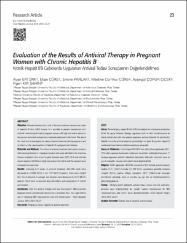Evaluation of the results of antiviral therapy in pregnant women with chronic Hepatitis B

View/
Access
info:eu-repo/semantics/openAccessDate
2014Author
Ertürk, AyşeCüre, Ekan
Parlak, Emine
Cumhur, Medine Cüre
Çopur, Ayşegül Çiçek
Kır, Figen Şahin
Metadata
Show full item recordCitation
erturk, A., Cure, E:, Parlak, E., Cure, M.C., Copur, A.C., Kir Sahin, Figen., (2014). Evaluation of the Results of Antiviral Therapy in Pregnant Women with Chronic Hepatitis B. Viral Hepatitis Journal, 20(1), 23-27. https://app.trdizin.gov.tr/makale/TVRjNU9UZzVPUT09Abstract
Amaç: Perinatal geçiş, hepatit B virüs (HBV) hastalığının en sık bulaşma yollarından biridir. Bu geçişi önlemek, bebeğe uygulanan pasif ve aktif immünizasyona ek olarak yüksek viral yükü olan gebeye uygulanan antiviral tedaviler ile mümkündür. Gebelik sırasında antiviral tedavinin güvenilirliğini ve gebe ile çocukta Hepatit B serokonversiyonu üzerine etkilerini araştırmayı amaçladık. Gereç ve Yöntemler: Kronik hepatit B (KHB)’li viral yükü yüksek gebelerden 2011- 2013 yılları arasında hastanemiz enfeksiyon hastalıkları polikliniğine başvuran 17 hastaya uygulanan antiviral tedavilerin (lamivudin, telbivudin, tenofovir) anne ve çocuk üzerindeki sonuçları retrospektif olarak değerlendirildi. Bulgular: KHB’li gebelerde HBV-DNA seviyelerinin 8-12 haftalık antiviral tedaviyi takiben 11/17 (%64,7) hastada ?10 000 IU/mL seviyelerine gerilediği ortalama >2log10 (IU/mL) azalma olduğu, hastaların 15/17 (%88,2)’sinde karaciğer enzimlerinin gerilediği, anne ve çocukta ilaç yan etki ve komplikasyonlarının gelişmediği gözlendi. Sonuç: HBsAg’si pozitif gebelerde antiviral tedavi sonrası viral yük azalmakta, perinatal geçiş engellenmekte, bu sayede “sadece immunizasyon ile HBV serokonversiyonu elde etme“ amacı desteklenmektedir. Objective: Perinatal transmission is one of the most common transmission routes of hepatitis B virus (HBV) disease. It is possible to prevent transmission with antiviral treatment performed in pregnant women with high viral load in adition to the passive and active immunization treatment performed in the infant. The aim of this study was to investigate the safety of antiviral treatment during pregnancy and its effects on the seroconvertion of Hepatitis B in pregnant and newborn. Materials and Methods: The effects of antiviral treatment (lamivudine, tenofovir, telbivudine) performed in 17 pregnant women who were admitted to the infectious disease outpatient clinic of our hospital between years 2011-2013 and who had chronic hepatitis B (CHB) and a high viral load on the mother andt the newborn were evaluated retrospectively. Results: Following 8-12 weeks of antiviral treatment, HBV-DNA levels were decreased to ≤10.000 IU/mL in the 11/17 (64.7%) patients, there were >2log10 (IU / mL) of reduction in average, liver enzymes were decreased in 15/17 (88.2%) patients. There were no observed drug side effects and complications in mother and newborn. Conclusion: After the antiviral therapy viral load decreased in HBsAg positive pregnant women and perinatal transmission is prevented, thus, this supported the aim of “obtaining HBV seroconversion only with immunization“.

















